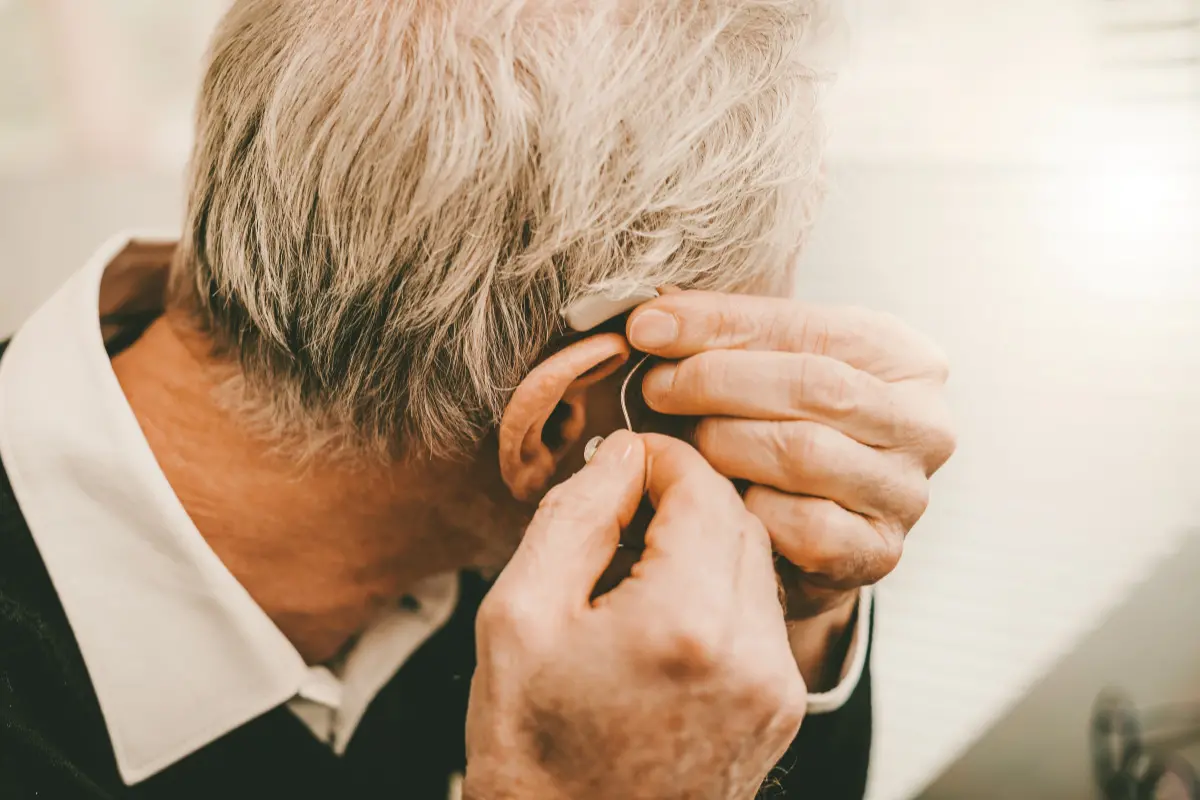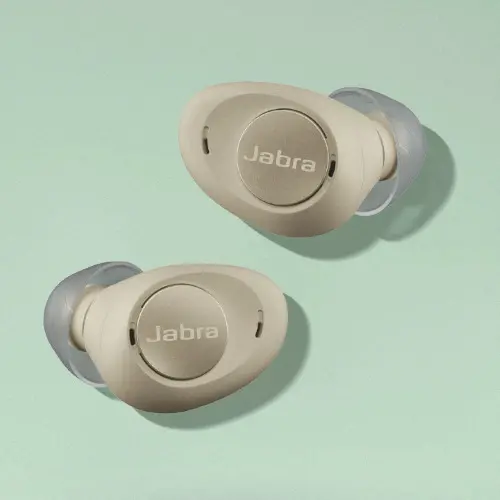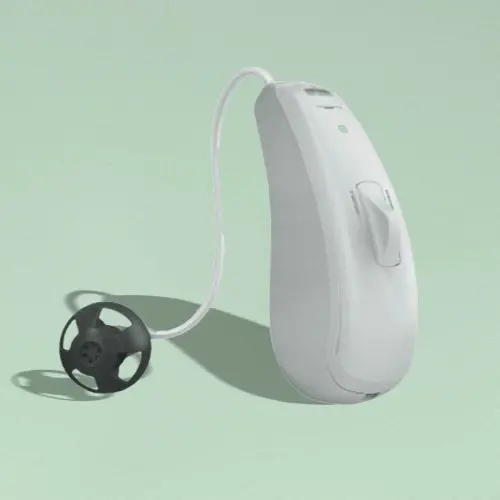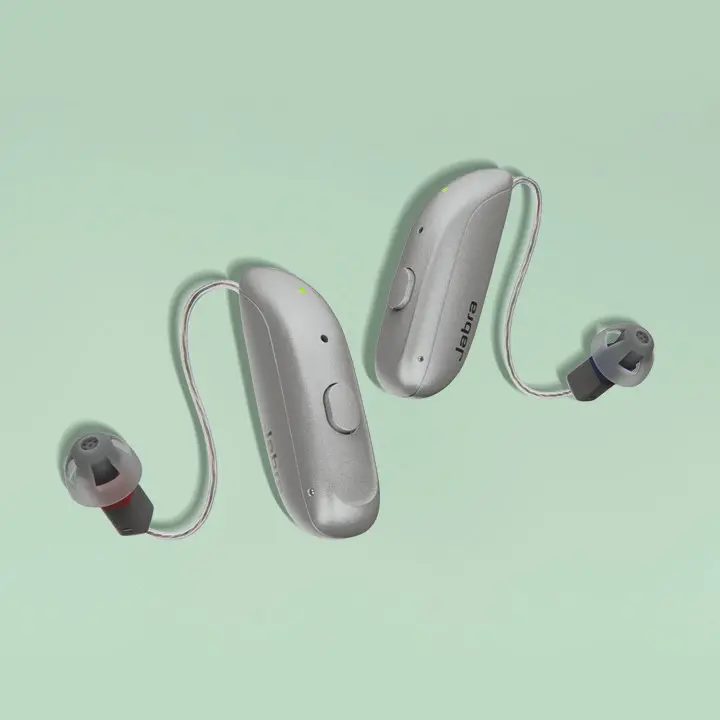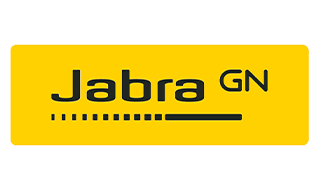Table of Contents
If you’re one of the 38.2 million Americans with hearing loss, you understand how frustrating and even debilitating hearing impairment can be. But treating hearing loss is often prohibitively expensive—the purchase of hearing aids is surpassed in cost only by that of a home and car for many Americans.
Thankfully, there are now more options for affordable hearing aids if prescription hearing aid prices exceed your budget. Jabra Enhance over-the-counter (OTC) hearing aids cost about half as much as some prescription devices, and they can treat mild to moderate hearing loss in adults 18 and older. After hand-testing more than two dozen hearing aids, we believe Jabra Enhance makes the best hearing aids on the market.
Which Jabra Enhance hearing aid is right for you?
- Jabra Enhance Plus: Great if you’re looking for an earbud-style hearing aid that’s rechargeable with Bluetooth streaming.
- Enhance Select 50R: Great if you want the least expensive, fully customizable Jabra Enhance hearing aid.
- Enhance Select 300: Great for some of the most advanced sound technology among OTC hearing aids.
- Enhance Select 500: Great for a micro size and Auracast, which lets users receive direct audio streams.
Why HelpGuide cares about hearing loss




Hearing and mental health are closely related. In fact, people with hearing loss tend to experience higher rates of anxiety, depression, and social isolation, which can result in loneliness and frustration, according to research.
Hearing loss is also a risk factor for developing dementia, with recent research showing how using hearing aids can slow cognitive decline in older adults and reduce the risk of dementia.
The impact of hearing loss on physical and mental health is far-reaching. This is why at HelpGuide, we’ve made it our mission to give every person access to the best information about hearing aids, so we can also help get quality products into the hands of people who need them.
Our Handbook Team hand tests every hearing aid brand we review, so we can feel confident recommending the best products for our readers. We consult with audiologists, researchers, and industry leaders in hearing health, as well as mental health experts, to vet our choices and help us better understand the nuances of how hearing health impacts physical and mental health.
We also put ourselves in the consumer’s shoes by mystery shopping brands and walking through the set-up process, just like new customers. Additionally, we interview real people with hearing loss and survey hearing aid users.
By compiling our testing data, interview and survey results, and insights from hearing care providers, we formulate a strongly informed perspective that we’re sharing with you here.
Learn more about our hearing aids review methodology.
HelpGuide Handbook for Jabra Enhance hearing aids
If you only learn five things about Jabra Enhance hearing aids, this is what you need to know.
Our testing experience
When the FDA approved OTC hearing aids in October 2022, the OTC hearing aid market experienced rapid growth with an influx of new companies. While this improves accessibility and helps drive down prices, it also muddies the waters. How do you know which products are trustworthy?
After surveying the market, interviewing hearing health experts, and speaking to hearing aid users, we curated a list of 21 OTC models to test from nine brands: Audien, Audicus, Eargo, Go Hearing, Jabra Enhance, Lexie, Lucid, MDHearing, and Sony. We chose these brands because they have positive reputations and represent a range of prices, styles, and features.
We also tested prescription models from Oticon, Phonak, and Starkey to experience the difference between OTC and Rx (prescription) hearing aids firsthand.
The process looked like this:
Our Handbook Team hand-tested every Jabra Enhance hearing aid, and based on our testing, we believe it’s the best OTC hearing aid you can buy.
When mystery shopping and testing Jabra Enhance hearing aids, we found all four models easy to use, the app detailed but simple to navigate, and the audiology team and technical support staff helpful every time we contacted them. When comparing the sound quality of Jabra Enhance hearing aids versus other OTC hearing aids, it was clear the Jabra Enhance models were a step above—background noise was lower, feedback/whistling was minimal, and Bluetooth streaming was easy to set up.

We did find some drawbacks: We were surprised by the two-week wait for our remote orientation session, which we felt was too long, especially for new hearing aid users. Other OTC brands we mystery shopped had remote orientation sessions open the day we called, or at least within seven days.
But Nancy Mills, the Jabra Enhance clinical audiologist who conducted our orientation, was knowledgeable about the device and how to access all of its features. If you’ve ever been to a hearing clinic, the experience was similar.
Remote services are helpful for many Americans who may have a hard time getting to an audiologist. For example, one study found that rural residents drive twice as far as urban residents for hearing care.
Dr. Mills explains the company tries to make it easy for customers to get remote support that’s as close to an in-person visit as possible. Jabra Enhance does this through its telehealth platform and comprehensive apps that work with the brand’s hearing aids.
From our tester
“Dr. Mills gave me more hands-on help than I expected from a remote appointment. Her demonstrations of each feature and program were extremely useful. The fact that she showed me how to do each task, including cleaning the hearing aids and changing wax filters, was immensely helpful compared to reading about them in the manual.”
Jabra Enhance’s excellent remote audiology care, coupled with its high-quality products, make the brand our top choice among OTC hearing aids.
Pros/Cons of Jabra Enhance hearing aids
What we liked
- Can customize Enhance Select models to your hearing loss.
- Optional audiology support for up to three years (many OTC brands offer no support).
- Above-average customer reviews.
- Sound technology comparable to entry-level prescription models.
What we didn’t like
- Only appropriate for mild to moderate hearing loss in adults.
- Not all models include hands-free calling.
- Bluetooth streaming is only available with iOS and some Android devices.
- Smartphone required for customization and remote adjustments.
- Audiology support is only offered remotely.
|
Jabra Enhance Plus
Visit Site
|
Enhance Select 50R
Visit Site
|
Enhance Select 300
Visit Site
|
Enhance Select 500
Visit Site
|
|
|---|---|---|---|---|
| Price per pair | $799 | $995 – $1,195 | $1,495–$1,695 | $1,795–$1,995 |
| Hearing aid type | In-the-ear | Receiver-in-canal | Mini receiver-in-ear | Micro receiver-in-ear |
| Degree of hearing loss | Mild to moderate | Mild to moderate | Mild to moderate | Mild-to-moderate |
| Battery type | Rechargeable | Rechargeable | Rechargeable | Rechargeable |
Jabra Enhance hearing aids reviews
Enhance Plus
The Jabra Enhance Plus is a small, earbud-style hearing aid with four directional microphones and advanced sound technology to improve speech clarity, particularly in noisy situations. Enhance Plus isn’t meant to be worn all day, but it’s designed for specific listening tasks, like hearing conversations in loud environments. When you use the quick hearing screen in the app, your Enhance Plus hearing aids will adjust to your hearing loss through self-fitting technology.
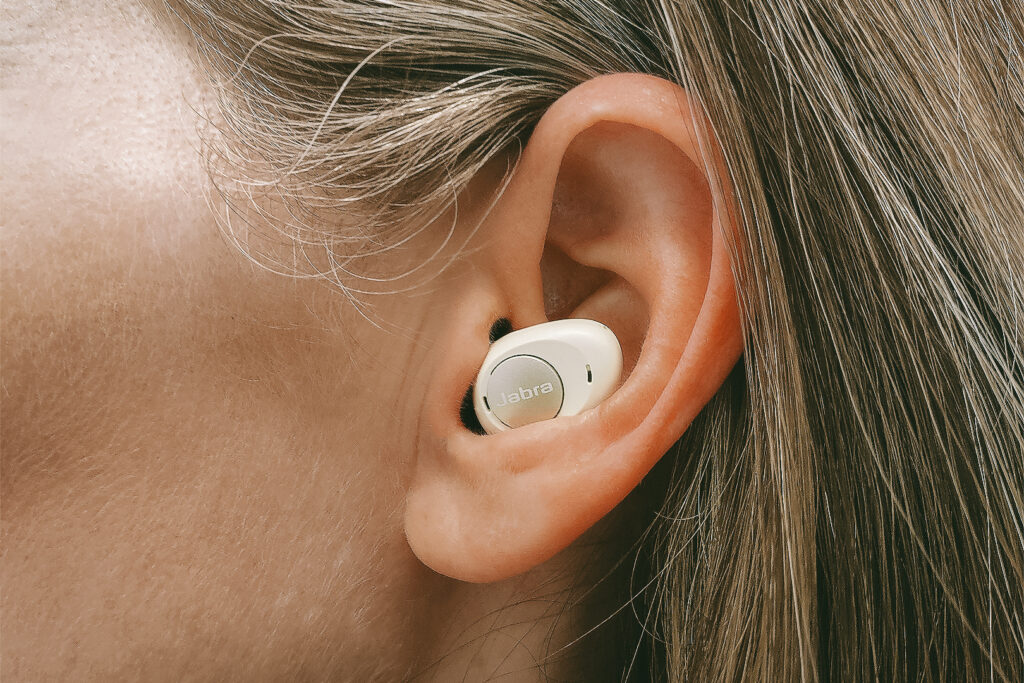
Compared with the Enhance Select models, we weren’t as impressed with the background noise reduction of the Plus, which was surprising since they’re advertised to help with hearing in loud environments. But we liked the comfortable fit and small size of these hearing aids. They were even smaller than the earbuds one of our testers normally wears for workouts.
For those new to hearing aids, these could be a good choice since the fit is intuitive (they rest in your ears like normal wireless headphones). For older adults with dexterity issues, the Jabra Enhance Plus will likely be the easiest Jabra one to handle.
From our tester
“These hearing aids are more discreet and comfortable than the earbuds I normally use. The sound quality is excellent too, and I like that this design creates less noise from wind and handling than devices that sit behind the ear.”
Jabra Enhance Plus includes standard hearing aid technology, such as:
- Background noise reduction to lower distracting sounds in your environment.
- Feedback suppression to reduce whistling.
- Directional microphones to amplify sounds in front of you.
- Bluetooth streaming from Apple devices (not compatible with Androids).
Jabra Enhance Plus comes with rechargeable batteries, which Dr. Mills calls “a game changer” due to the convenience and ease of use they provide. They last up to 12 hours on one charge, and the case holds three full charges. It takes about two hours to fully charge the hearing aids, which is fairly standard for all Jabra Enhance hearing aids (average charging time is two to four hours).
With the Plus model, you only get a one-year warranty against manufacturer’s defects, which we found to be a drawback. And while you’ll get technical support if you have problems with the hearing aids or the app, you won’t be able to get them customized for your hearing loss or access the company’s audiology team for help. While Enhance Select hearing aids are pricier than Enhance Plus, you can choose a package that includes three years of comprehensive warranty and audiology support.
But if you like a rechargeable earbud-style design and are happy operating your hearing aids by yourself, Jabra Enhance Plus could be a great option.
Enhance Plus
Our verdict: The Enhance Plus is an in-ear rechargeable device that streams audio and looks nothing like a hearing aid.
Enhance Select 50R
While the Enhance Select 50R isn’t cheap at $1,195 per pair, it’s the lowest-priced hearing aid sold by Jabra Enhance in this style. The company recommends this model for listening in quiet situations and small groups. While testing the 50R, we also found background noise was a bit louder compared with the 300.
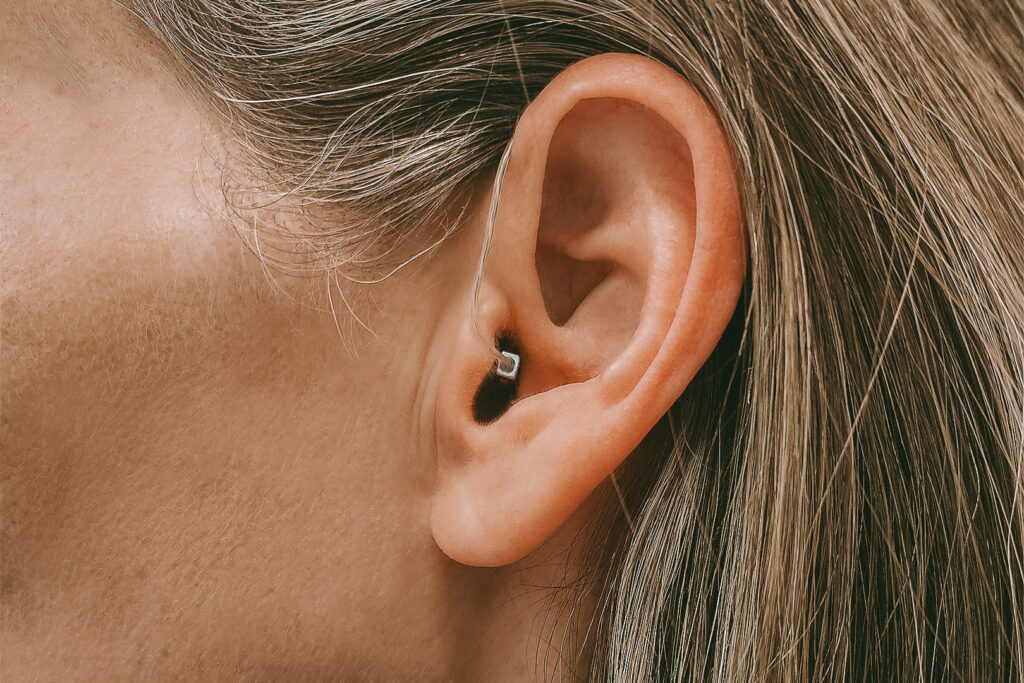
Like the Jabra Enhance Plus, we found the Enhance Select 50R comfortable and lightweight. From our hands-on testing, we were pleased to find the Enhance Select RIC models are even less noticeable and bulky than the Enhance Plus earbuds because the wire running from the body of the hearing aid into your ear canal is almost invisible.
From our tester
“I prefer the look and feel of these hearing aids over earbuds. They don’t fill up my ear canal, so my ears don’t get hot or feel plugged up, and you can barely see them behind my ears.”
Like all Enhance Select hearing aids, the Enhance Select 50R offers Bluetooth streaming from iOS and certain Android devices, making it one of the least expensive Bluetooth hearing aids on the market.
You can also change listening settings and volume using the Jabra Enhance Select app or the buttons directly on the hearing aids. Compared with other brands, we didn’t like that Jabra Enhance hearing aids only beep when you change programs, while other brands give a vocal cue indicating the selected program.
The Enhance Select 50R uses rechargeable batteries and comes with a convenient desktop charger.
If you are often in quiet listening environments, the Enhance Select 50R could be right for you.
Enhance Select 50R
Our verdict: The Enhance Select 50R is a slim receiver-in-ear hearing device with Bluetooth streaming and a small rechargeable battery.
Enhance Select 300
The technology in the Enhance Select 300 includes the greatest frequency bandwidth of any Jabra Enhance device and improved background noise reduction. Automatic adjustments make background noise less distracting and speech easier to understand in both quiet and noisy environments.
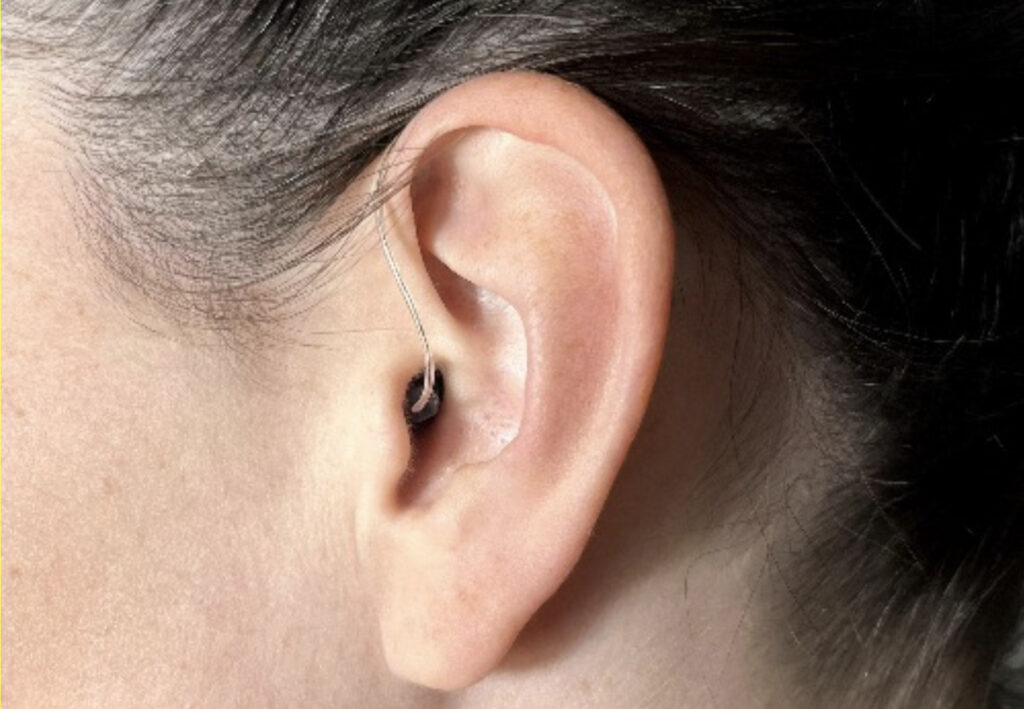
“Our premium hearing aid, the Jabra Enhance Select 300, utilizes binaural directionality, which means the hearing aids work together to seek out speech versus noise and amplify that speech signal over the noise,” says Briana Burgan, a clinical audiologist at Jabra.
You’ll also be able to take hands-free calls on iPhones 11 and newer, and you can choose from five colors that offer a subtle sheen to blend in more closely with your hair.
Brian Murray, a hearing aid specialist from Raleigh, North Carolina, notes the sound technology in Enhance Select 300 hearing aids outrank that of some entry-level prescription hearing instruments, at a comparable price. But you’ll only get remote support from the Jabra Enhance audiology team, whereas prescription hearing aids come with in-person support from an audiologist.
That’s why it’s important to look at cost when shopping for hearing aids, as well as your specific needs and preferences. If you’re comfortable with remote support and using a smartphone app to adjust your hearing aids, Jabra Enhance Select 300 is one of the best choices on the market. But if you’d prefer the added level of help offered at a hearing care clinic, you may want to look into prescription devices.
From our tester
“The Enhance Select 300 is discreet and highly comfortable, and the manual offers lots of instructions and support.”
Someone with an active lifestyle who needs a hearing aid with advanced sound features for various listening environments may find the Enhance Select 300 will fit their needs well.
Enhance Select 300
Our verdict: The Enhance Select 300 is a top-of-the-line OTC hearing aid with Bluetooth streaming, hands-free calls, a rechargeable battery, and includes some of the most advanced sound processing this brand offers.
Enhance Select 500
The Jabra Enhance Select 500 is Jabra’s highest-technology hearing aid. It has all of the same features as the Select 300, like rechargeable batteries, Bluetooth, and hands-free calling, with some advancements, including TapControl and Bluetooth LE Audio, which can improve sound and battery life.
When the technology becomes available, the Select 500 will also work with Auracast, a direct streaming technology that event centers, concerts, and transit stations are expected to offer in the future. Because the Select 500 is already set up for Auracast, users will be able to enjoy it as soon as it launches. The 500 also provides greater depth of sound than the 300, improved speech understanding in noisy settings, and minimal disruption from repetitive background sounds (like dishes clattering or dogs barking).
Like the Select 300, the Select 500 can only perform hands-free calling when used with an iPhone 11 or higher or compatible Android devices. (The Bluetooth features work with all Apple devices, however.) The Select 500 also comes in the same five colors to match skin and hair tones.
One standout feature of the Select 500 is its smaller size—it’s a micro-size receiver-in-the-ear design and Jabra’s smallest-size hearing aid. Each hearing aid measures 1.02″ L x 0.29″ W x 0.44″ H and weighs 2.12 grams.
From our tester
“Someone who finds traditional hearing aids uncomfortable may appreciate the Select 500’s smaller size. Anyone who leads a very active lifestyle or attends many events or concerts may benefit from the improved sound technology it offers.”
Enhance Select 500
Our verdict: The Enhance Select 500 is Jabra’s top and smallest OTC hearing aid with Bluetooth streaming, hands-free calling, TapControl, Bluetooth LE Audio, a rechargeable battery, and the most advanced sound processing this brand offers (the only device in this review with all of these features).
How Jabra Enhance ranks
We tested hearing aids from over 10 different brands based on a range of factors including price, style, features, brand reputation, and more. Here’s where Jabra Enhance ranked in some of our 2024 roundups:
- Best hearing aids
- Best over-the-counter hearing aids
- Best bluetooth hearing aids
- Best affordable hearing aids
Key features of Jabra Enhance hearing aids
Standard features
See below for a breakdown of the standard features included with every Jabra Enhance hearing aid.
One of the ways Jabra Enhance stands out in the OTC hearing aid market is every device in its lineup comes with Bluetooth streaming. That’s not a common feature among OTC devices, and it’s a popular one among younger hearing aid users.
Danielle Brestel, 46, from Durham, North Carolina, has worn hearing aids for the past year and a half. “My favorite thing about my hearing aids is the Bluetooth feature, so you can listen to phone calls, music, and tinnitus apps directly in your hearing aids,” she says.
While many OTC devices only have Bluetooth connectivity to an app for making listening adjustments, Jabra Enhance hearing aids add audio streaming capability for music and movies. The Enhance Select 300 model also allows hands-free calling with iPhones 11 and newer.
Optional features
In addition to the above standard features, you can also customize the below features, depending on the model you choose:
- Basic vs. advanced sound technology.
- Desktop vs. portable battery charging.
- Standard vs mini or micro-size.
- One-year vs. three-year warranty.
- Basic customer support (no audiology support) vs. premium (remote support from the audiology team for three years).
Buying Jabra Enhance hearing aids
Before ordering your Jabra Enhance hearing aids, you can take a free hearing test on the company’s website. While online tests aren’t diagnostic like in-person hearing exams, they can gauge your level of hearing loss to indicate whether Jabra Enhance hearing aids will be able to meet your needs. If you’re 18 years or older with mild or moderate hearing loss, an OTC hearing aid like the ones made by Jabra Enhance could be a good fit.

If you purchase Enhance Select 50R, 300, or 500 and select the Premium package, your hearing aids will be programmed by the Jabra Enhance audiology team to match your online hearing test results. You can also send in previous audiogram results if you’ve had an in-person hearing exam.
When your hearing aids are shipped, Jabra Enhance will email you to schedule your online orientation with a Jabra Enhance audiologist. We found the audiologist helpful and appreciated the hour-long walk-through, which went over how to download the app, connect our hearing aids to our phone, and properly fit the hearing aids in our ears. She also went over how to clean, charge, and use them. This type of orientation is unique to just a few OTC hearing aid brands, and we liked the personal care it provided.
Nicholas Reed, an audiologist at Johns Hopkins University in Baltimore, Maryland, spoke to our team about the effectiveness of remote care for people who need help with their hearing aids. He says in many cases, it’s sufficient for troubleshooting issues and provides much-needed access to audiologist services, especially for people who otherwise couldn’t get them due to cost or location.
“Telehealth is a must-have in a world like this,” said Dr. Reed, “especially because we don’t have the services spelled out [for OTC devices]. And even if you wanted to rely on the current professionals, there aren’t enough professionals to [provide] services.”
Getting help with hearing loss can be a challenge for a number of reasons. We spoke with Christina Peoples, a gerontologist from Greensboro, North Carolina, about how to help people feel more comfortable wearing hearing aids.
It’s OK if you have to get a hearing aid. It doesn’t take away from your worth, it doesn’t mean there’s something wrong with you. Hearing messages like that can really make a difference in our perspective and then encourage us to do whatever we need to address our issues.
Christina Peoples, MS
The personalized care and telehealth model offered by Jabra Enhance are two ways this company lowers barriers to hearing care for the people who need it.
Where to purchase Jabra hearing aids
Jabra Enhance Select and Jabra Enhance Plus hearing aids can be purchased directly through the Jabra website. Jabra Enhance Plus aids are also available for online purchase through Amazon. If you prefer to shop for Jabra Enhance hearing aids at a retail store, you can visit your local Best Buy (call ahead to confirm that they’re in stock).
How much do Jabra Enhance hearing aids cost?
Jabra Enhance hearing aids cost $799–$1,995 per pair. That’s about half the price of an average pair of prescription hearing aids (when looking at the cost of hearing aids bundled with after-purchase care), and the sound technology rivals some of those higher-priced devices.
One audiologist we consulted says high-end prescription hearing aids cost around $1,400 each without after-purchase care. That equals $2,800 per pair, which is $800 more than you’ll pay for the Enhance Select 500 with three years of audiology support.
With any of the three Enhance Select models, you can choose between a Basic or Premium package. You’ll pay the low end for each model if you choose the Basic package and the high end with the Premium package.
The Basic package provides general customer assistance but no audiology support for programming or adjustments. It also doesn’t include hearing aid customization to your hearing loss profile.
For an additional $200 per pair, the Premium package offers the following services:
- Custom programming to match your hearing test results.
- Remote video orientation with a hearing care specialist.
- Three years of remote audiology support.
- Three-year warranty protection against manufacturer’s defects, loss, and damage.
- One-time replacement (after paying a deductible of $175–$195).
While most insurance plans won’t cover the full cost of your Jabra Enhance hearing aids, terms vary and some private insurance plans may cover a portion of the cost. Check with your health insurance provider for specific coverage details.
If you need help staggering payments for your hearing aids, Jabra Enhance offers third-party financing for up to three years through Bread, with a monthly cost of $26–$65 depending on the model.
How to use the Enhance Select app
The Jabra Enhance Select app is rated 4.6/5 stars on Google Play and 4.8/5 stars at the App Store. You can use the app to make volume and program adjustments, learn how to use your devices, reach customer support, and troubleshoot issues with your hearing aids.
After hand-testing the app on both an Android and iPhone, we found the Enhance Select app easy to use and intuitive. The app’s four pre-set programs (all-around, restaurant, music, and outdoors) are good if you want to cycle between programs. And the app also lets you adjust parameters, like volume, bass, treble, left and right balance.
But what we really liked was the ability to schedule both a remote adjustment and a video check-in with a member of the audiology team—other OTC brands allow you to contact customer support through apps, but the Jabra Enhance app is the only one we’ve seen that lets you schedule remote adjustments (when a specialist will adjust your hearing aids in real-time) as well as video check-ins. When our tester had her hearing aids adjusted remotely during her video orientation call, the adjustments were immediate and instantly sharpened her listening profile. Booking a telehealth audiology appointment and requesting a remote appointment directly from the app are simple.
See below for a video we recorded that walks you through the various functions of the Jabra Enhance app.
Our final verdict
Our experience with Jabra Enhance has convinced us this company makes the best OTC hearing aids on the market.
From our rigorous hands-on testing and mystery shopping, we found a lot to like about Jabra Enhance, including the high quality of every Jabra Enhance device and the company’s knowledgeable and helpful audiology staff and customer support. Our testers were also impressed by the sound technology of the 300 model, which is comparable to an entry-level prescription device—something we haven’t encountered before in our two years of testing OTC hearing aids.
If your hearing loss is mild or moderate, you’re 18 or older, and you’re comfortable with remote audiology care and using an app to adjust your hearing aids, Jabra Enhance devices could be the perfect fit.
Frequently asked questions
Jabra Enhance hearing aids cost $799–$1,995 per pair.
Yes, Jabra devices are real hearing aids. Jabra manufactures a line of medical-grade devices with various styles and features that offer speech clarity and hearing solutions based on your specific preferences and needs. In addition to Jabra Enhance OTC hearing aids, the company produces Jabra Enhance Pro prescription hearing aids, which are available for purchase at Costco.
GN Group manufactures Jabra Enhance hearing aids and the brands ReSound and Beltone.
Jabra Enhance is a different brand than ReSound, but they’re both made by the manufacturer GN Group. Jabra Enhance hearing aids primarily include OTC devices (with the Jabra Enhance Pro prescription model sold exclusively at Costco hearing centers). ReSound is a prescription brand sold at hearing care clinics.
- Goman, A.M. & Lin, F.R. (2016). Prevalence of hearing loss by severity in the United States. American Journal of Public Health, 106(10), 1820-1822. Link
- Lin, Frank R. (2018). Time for a top-down approach to hearing aid affordability and accessibility. American Journal of Public Health, 108(2), 166-168. Link
- Chan, S., Hixon, B., Adkins, M., Shinn, J.B., & Bush, M.L. (2017). Rurality and determinants of hearing healthcare in adult hearing aid recipients. The Laryngoscope, 127(10), 2362-2367. Link



